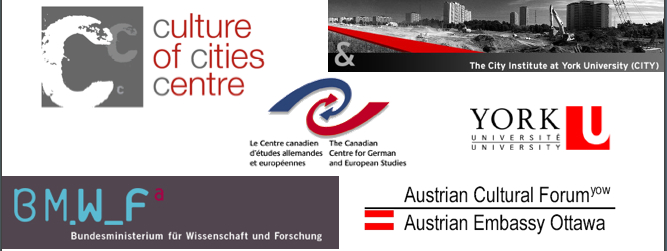
Invitational International Workshop
“Visibility and Performativity in Urban Life: Migrants, Margins, Meanings”
September 6-8, 2007
York University, Toronto, Canada
“Making visible” is one of the driving forces of modernity according to the work of Michel Foucault. As both an intrinsic quality of discourse and the aim of methods of inquiry, the production of evidence served to organize what Foucault in his later writings called “biopolitics.” Interested in how the modern state and its institutions politicized every aspect of human life, Foucault focused on the paradox of subjectivity and subjection as the fate of the modern individual. On the other hand, urban anthropology (Richard Sennett, Vanessa Schwartz, etc.) has demonstrated that “becoming” visible is one of the prerequisites of individuals and collectives participating in, and articulating themselves into, the modern urban environment. Apart from or alongside the political systems of representation, the power to perform one’s own – potentially subversive – identity in public promotes the empowerment and impact of those who are not formally represented in, or are even excluded from, public spheres.
While “becoming visible” and “making visible” can be conceived of as two interlinked modes of emergent subjectivity, both processes point to the ambivalences of urban modernity. Whether visibility is advantageous depends on a complex set of motivations, strategies, expectations for the future, and more. This seems particularly true for migrants and migrant communities and for people living at the margins of society, such as the homeless, the working poor, bohemians, etc. – groups which sometimes seem to be implicated directly in migration or are connected with imaginings of a nomadic or exotic “other”. Whatever sets them apart, these groups – migrants and marginal individuals – can thus at least be identified and categorized by shared experiences and the same methods of social classification.
Der Workshop “Visibility and Performativity in Urban Life: Migrants, Margins, Meanings” wird den Spuren nachgehen, die MigrantInnen und Marginalisierten hinterließen, bzw. nicht hinterließen, und wird konkreter der Frage nachgehen, wie sich ihre „Sichtbarkeit“ oder „Unsichtbarkeit“ mit eigenen oder institutionellen Politiken und Strategien verbindet. Während demographische, ökonomische, ethnokulturelle u.a. Konzepte bei dieser Analyse räumlich-kultureller Figurationen von Migration auf mehr oder weniger vordefinierte Identitäten und Interessenslagen zurückgreifen und die Auseinandersetzung mit den Marginalisierten zumeist den Überwachungs- und Kontrollprozeduren der Institutionen folgt, öffnet das Epistem der „Sichtbarkeit/ Unsichtbarkeit“ ein Feld von komplexen Machtbeziehungen, die ein weites Spektrum von Handlungsmöglichkeiten zwischen Selbstartikulation und (im Sinne Foucaults) askribierter Subjektivierung erfasst.